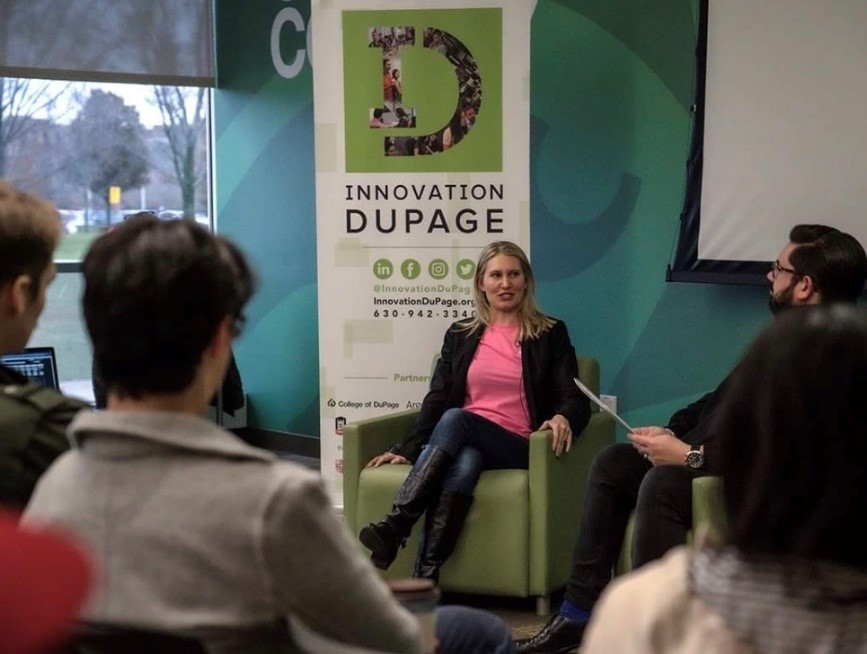As colleges and universities formalize their plans for the fall semester and the trillion-dollar student debt problem escalates, it has been widely predicted that one form of institution of higher education might show a rise in enrollment amid the uncertainty: Community Colleges.
Even students who already accepted admission to four-year schools are increasingly seeing the value in attending community colleges, whether for a “gap year” or longer, especially since so many course offerings at institutions of learning will continue to be offered online via remote learning platforms such as Zoom and Blackboard.
We reached out to Dr. Maureen Dunne for an interview about the increasingly important role of community colleges.
Dr. Maureen Dunne – the first community college graduate to be named a Rhodes Scholar – serves as Trustee at the College of DuPage near Chicago, IL. Dr. Dunne was also recently elected as an Illinois statewide officer (Secretary and Chairman Pro Tempore) of the Illinois Community College Trustees Association (ICCTA) by college trustees across the state. Dr. Dunne also serves as Trustee Liaison to the Board of Innovation DuPage, an entrepreneurship accelerator that was born out of a collaboration between the county government of DuPage, the organization “Choose DuPage”, and the College of DuPage.
As part of community college month, ICCTA asked Maureen to write an essay about how her community college experience and her journey through higher education impacted her worldview and her ability to translate lessons in the classroom to important life challenges. The full essay offers a number of unique insights and can be found here.

Now, our interview with Dr. Maureen Dunne, edited for length and clarity.
Journal Transcript: As the $1.5 trillion-dollar student debt crisis garners national attention, a critical question appears to evade acknowledgement: What will the future of available work opportunities look like? What will be the role of the community college?
Dunne: Future workforce trends inevitably point to a demand for flexible and creative problem-solvers willing to embrace a new era of ‘life-long education.’ It is anticipated that many current careers may no longer exist in a decade or will be transformed beyond recognition. It is likely that, to some extent, we will all need to learn to adapt and work alongside AI driven machinery, regardless of career path. This is not to imply that technical skills will be the only skills that matter. In my opinion, mastery of “soft skills” such as the ability to work well with teams, empathy, and the honing of creative problem-solving skills is just as critical and perhaps will become even more important in the future.
The community college of the future needs to evolve into a primary resource for local residents to retool skills throughout one’s lifetime. Those returning to college due to job displacement might already have a four-year degree but still enroll in a community college to learn new skills increasingly in demand by employers. Similarly, a contract software engineer looking to sharpen his or her critical thinking skills might enroll in philosophy and literature courses to remain competitive.
Put another way: We need to embrace a proactive strategy to 21st-century skill development. And community colleges will likely come to play a crucial role in that process over coming years.
JT: There is speculation that community colleges will see an increase in enrollment due to Covid-19 in addition to debt management. Do you think this will be temporary? What are your views on this in the long run?
D: According to the National Center for Public Policy and Higher Education, community college enrollees already comprise approximately 40% of all higher education students. Future trends indicate that this percentage may become substantially larger if community colleges take a leading role in upskilling throughout one’s career trajectory.
Many colleges appear to be preparing for a temporary decline in enrollment. However, due to Covid-19, my understanding is that there is the possibility of increased deferred admission rate to a four-year university while spending a “gap year” exploring a potential career and inexpensive coursework at community college. A recent research report even suggested that community colleges could potentially benefit by seeing an enrollment increase up to as high as twenty percent – if they handle the challenges presented by Covid-19 well in their offerings.
Such a student choosing to attend a community college, at the start, would not only receive, in the end, a four-year degree from their preferred university but would be demonstrating a proactive approach to debt management. It might even be possible to avoid student loans altogether after transferring from community college as many transfer students become eligible for additional scholarship funding after outshining their high school performance.
I also know that many grant-funded programs – including a community college to four-year college bridge program for students on the autism program that I spearheaded – is being moved, at least in part, to an online program to offer flexibility and support during these uncertain times.
For all these reasons and more, our network of community colleges may be more important now – and in the years ahead – than ever before.
JT: Wouldn’t all institutions of higher education benefit from closer partnerships with business?
D: Yes. All institutions of higher education in the future will need to adapt to address rapidly changing workforce needs as a result of technological innovation and automation. Nonetheless, there are few institutions nimble and deft enough to evolve in step with the evolution of workforce needs at a community level. Models of higher education will need to adapt to truly embrace the philosophy of life-long learning demonstrated by a diverse range of accessible, affordable skill-building programs.
With the inclusion of business incubators at some colleges that promote entrepreneurship, it is becoming more common for students to work on developing important skills both inside and outside of the classroom, including joining project teams and startup companies. Such opportunities could complement more traditional skill-building exercises by giving students the opportunity to gain first-hand experience to innovate with diverse teams. Larger companies can also benefit by sponsoring innovation projects and offering internships or apprenticeships. Deeper partnerships between institutions of higher education and companies in the future, I believe, will be mutually beneficial.

JT: Let me follow up about a question related to education and entrepreneurship. I recall you were the main speaker at a Fireside Chat at Innovation DuPage about entrepreneurship in which a lot of students and community members attended. Given your solid academic background, how is running an innovative business different than what you expected? What would you recommend to entrepreneurs?
D: The texture of everyday life running a business and dealing with difficult to categorize problems and challenges is messy and nuanced, and it rarely fits into an idealistic textbook model of how business is supposed to work.
And the point I am trying to make is that I think the most successful people – not just in innovation and startups – get over their fear of failure. The learning process inevitably requires students to push themselves beyond their comfort zones. Great entrepreneurs realize that not trying to innovate and make progress is riskier than the possibility of failure. It helps a lot to learn to manage your own psychology, including the inevitable ups and downs. Entrepreneurship, by its very nature, encourages habits such as learning from mistakes, engaging heavily in the iterative process and becoming a good listener.
I think that entrepreneurial experience can translate into a range of important life and career skills, especially considering future workforce trends. I also think there is room within more traditional education to also further encourage students to take innovative risks and to perceive mistakes (and even failure) as a necessary part of the learning process on the path to success. The kind of innovation that changes and shapes the world rarely, if ever, happens without numerous attempts and different iterations. Not giving up is key.
In conclusion, Dr. Dunne brings up many interesting ideas packaged in a spirit of proactive insight.
The overriding sense that emerges is that, regardless of which form of higher education institution is chosen, students will face a critical need for the development of “soft skills” such as empathy and teamwork, as well as core problem-solving skills rooted in creativity.
The future of work will demand, above all else, creativity, problem solving, and good “people skills”, in addition to technological literacy.
David Brooks of the New York Times recently offered his opinion on the importance for future leaders of what he outlined as character-centered education, including the humanities. The point he makes is that, while science is important to problem solving, so is learning “the great lessons from the past on how to lead, endure, triumph or fail.” He quotes a headmaster as saying schools also have some responsibility in encouraging their students to be “acceptable at a dance, invaluable in a shipwreck.”
Great teachers and an entrepreneurial spirit, according to Dunne, are essential not only to the future of work but to the progress of humanity.


